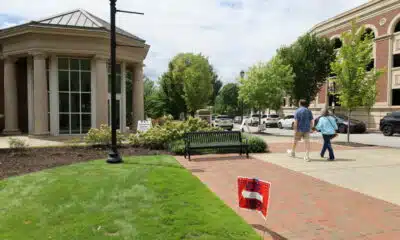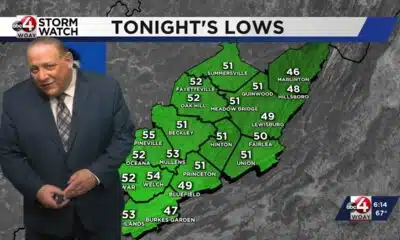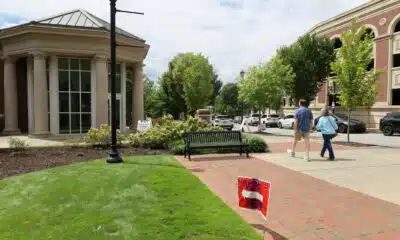News from the South - Texas News Feed
Crockett is installing sirens after devastating tornado
“How a small East Texas town turned a devastating tornado into funding for sirens” was first published by The Texas Tribune, a nonprofit, nonpartisan media organization that informs Texans — and engages with them — about public policy, politics, government and statewide issues.
Sign up for The Brief, The Texas Tribune’s daily newsletter that keeps readers up to speed on the most essential Texas news.
A small East Texas community is in the final stages of installing a state-of-the-art disaster warning system officials have been working toward for years.
Six new sirens will be placed strategically throughout the city of Crockett, about two hours north of Houston. City officials say they applied for a FEMA Hazard Mitigation Grant in 2023 after a tornado tore through the county a year prior that caught many residents unprepared.
“We’re in hurricane season. And while we’re not right on the coast, depending on which side of the aisle you’re on, you get the occasional spin off tornadoes,” said Lee Standley, Crockett’s assistant city manager.
Crockett’s success in accessing federal hazard mitigation funds comes amid deafening public outcry about the role government inaction played in the lack of sirens in Kerr County and whether such a warning could have curbed the devastating July 4 flooding death toll. Rural communities notoriously struggle to access such federal funds because densely populated urban cores receive priority and rural governments don’t have the budget to pony up dollars required to match the federal share.
Experts say Crockett’s success is likely due to an uncommon mixture of timing, know-how and will power.
“It takes state and federal agencies working on the ground with the community to make sure they both understand the risk, and — very importantly — that they have the tools and resources they need to do something about it,” said Kristin Smith, a lead researcher for Headwaters Economics, a Montana-based nonprofit that helps communities with land management.
Crockett’s approach
After a pre-construction meeting on July 10, Crockett Construction began ordering sirens. They hope to beat a potential rush on this warning system following the devastating and deadly floods in Central Texas, company owner Chris Morris said.
Home to about 6,300 people, as of 2023, Crockett sits in the center of Houston County, which was one of 16 counties impacted by a tornado outbreak in mid-March of 2022.
A tornado that reached 125 mph was on the ground for 19 miles along Highway 21 around 10 p.m., damaging about 30 structures and displacing more than 70 people from their homes and injuring 10.
“We had no advance warning whatsoever,” Standley said. “When we learned we were eligible for the FEMA Hazard Mitigation grant, it just came right up to the top of our list.”
Once the sirens are installed, hopefully by the fall, Crockett will have a multi-layered disaster warning system. Residents can sign up to receive text messages through the Genasys notification system and check social media as well.
Every community knows it has to prepare for some type of natural disaster, but not every community has the tools to do so, Smith said.
Instead of preparing, communities often resort to reacting to disasters, which is costly. The National Institute of Building Sciences found that for every dollar spent by the federal government on mitigation, it saves taxpayers $6.
Crockett is unique in that it is led primarily by people who have a history in emergency response, Standley said. He was a fire marshal and police officer before taking on the role of assistant city administrator. The city manager, John Angerstein, was a fire chief.
The city council in 2023 knew sirens would have benefited many of their residents in 2022 and began working toward the federal grant. This required significant time, effort and financial planning.
FEMA is investing $500,000 in the siren system, with Crockett matching 10% – or $50,000. Crockett’s 2024-25 general fund budget was $6.6 million.
This is not something that every community in Texas is able to do.
“It’s nothing more than being conservative in your budget, to hold a little bit back to be able to match the grant,” Standley said. “Sometimes cities just can’t. There were years that we would not be able to. We were fortunate when this came available that we were able to make the match, and it all worked out.”
Dependability of federal funds
Matching funds are just one of the barriers communities must overcome to access federal support.
In 2024, more than 100 Texas counties had no hazard mitigation plans – which precluded them from federal disaster grants. In Kerr County, the hardest hit by the July 4 flood, a FEMA funding request for weather warning upgrades was denied because it didn’t have such a plan updated.
And even those who do have those plans don’t always have the staff or capacity to apply for and maintain a federal grant, Smith said.
It takes a lot of time, effort and patience to get through the process. Crockett applied for the FEMA grant a little over two years ago and is just now starting the physical work.
Furthermore, even communities who have the time, staff and resources to apply aren’t guaranteed to actually receive federal support.
“Communities want to do this proactive work, but it’s very challenging to access the funding because it’s so competitive,” Smith said.
The FEMA Building Resilient Infrastructure and Communities grant, last year had over 1,200 communities requesting assistance. There were $5.6 billion dollars in requests but FEMA only had $1 billion available, Smith said. Many of those dollars went to populous counties, such as Harris County, rather than smaller, rural communities.
And the future of federal support is uncertain. The BRIC grant was shuttered in April and some applicants who had been approved for funding never saw a dollar.
Texas lawmakers will reconvene for a special legislative session on July 21 with a priority being disaster relief and recovery following the July 4 floods. Smith believes a more localized approach to disaster preparation could be better for Texans.
“State dollars can just be a little bit easier to access for rural and lower capacity communities than federal dollars,” Smith said.
Shape the future of Texas at the 15th annual Texas Tribune Festival, happening Nov. 13–15 in downtown Austin! We bring together Texas’ most inspiring thinkers, leaders and innovators to discuss the issues that matter to you. Get tickets now and join us this November.
TribFest 2025 is presented by JPMorganChase.
This article originally appeared in The Texas Tribune at https://www.texastribune.org/2025/07/15/crockett-texas-installs-sirens-hill-country-flood/.
The Texas Tribune is a member-supported, nonpartisan newsroom informing and engaging Texans on state politics and policy. Learn more at texastribune.org.
The post Crockett is installing sirens after devastating tornado appeared first on feeds.texastribune.org
Note: The following A.I. based commentary is not part of the original article, reproduced above, but is offered in the hopes that it will promote greater media literacy and critical thinking, by making any potential bias more visible to the reader –Staff Editor.
Political Bias Rating: Centrist
This article presents a straightforward report on the installation of disaster warning sirens in Crockett, Texas, focusing on local government efforts and federal funding mechanisms. It provides balanced coverage of challenges faced by rural communities in accessing federal grants, while highlighting cooperation between state and federal agencies without partisan framing. The piece avoids ideological language or politically charged commentary, reflecting a neutral and fact-based approach common in public interest journalism.
News from the South - Texas News Feed
Kerr youth camps seek Patrick’s help on proposed flood rules
“Kerr County youth camps appeal to Dan Patrick on proposed floodplain restrictions” was first published by The Texas Tribune, a nonprofit, nonpartisan media organization that informs Texans — and engages with them — about public policy, politics, government and statewide issues.
Sign up for The Brief, The Texas Tribune’s daily newsletter that keeps readers up to speed on the most essential Texas news.
The owners of three Kerr County youth camps have asked Lt. Gov. Dan Patrick to reconsider some of the stricter new flood safety requirements contained in two bills before the Texas Legislature that have been filed as a result of the tragic July 4 Guadalupe River flooding that killed 27 Camp Mystic campers.
Two camp safety bills, House Bill 1 and Senate Bill 1, would withhold state licensing if cabins are located in a floodplain. A week ago, both bills were passed by their respective home chambers.
Late Friday, The Texas Tribune obtained an Aug. 28 letter sent to Patrick by the owners of Camp Waldemar, Vista Camps and Camp Stewart. In it, the camp owners cite the cost of rebuilding cabins and ask Patrick to “work with us” by having an expert to propose “a safe and professionally analyzed solution through the Texas Water Development Board for the 100-year floodplain prohibition.”
The camp owners also insisted that there “must be meaningful financial support, whether through insurance, state grants, or other funding mechanisms, so that the burden does not fall solely on families, camps, and communities.”
State Sen. Charles Perry, R-Lubbock, who chairs the Senate Select Committee on Disaster Preparedness and Flood and the primary author of one of the bills, told the Tribune last week there would be no state assistance for camps to comply with pending legislation if it passes.
“No, camps are private enterprises,” Perry told The Texas Tribune after family members of the 27 Camp Mystic flood victims testified before his committee on Aug. 20. “The state’s not rebuilding private sector camps.”
The Texas Tribune reached out to Patrick’s office for comment on the letter, which was also forwarded to members of the Texas Senate and Gov. Greg. Abbott, and did not get an immediate response. The Tribune left phone messages at all three camps, asking for more detail and comment on the letter, but none were returned. The Tribune reached Meg Clark, executive director of Camp Waldemar late Friday. She confirmed the contents of the letter but declined to offer additional comment.
The two special legislative committees appointed after the July 4 disaster so far in public hearings have resisted discussing restricting development in floodplains statewide. Requiring camps to move cabins out of the floodplain was the biggest step they had taken in that direction — and is a major piece of the legislation. Flooding experts say getting kids out of risky areas as they sleep is a clear way to help protect them.
Originally, legislators had planned just to require that camps evacuate kids from campgrounds in the floodplain if the weather service issued a flash flood warning and to install ladders on cabins so campers could climb onto rooftops if the situation grew dire and for some reason they hadn’t evacuated. But parents of the kids who died at Camp Mystic pushed to get more restrictive, camp-focused legislation on the table.
“The combination of devastating floods and the heavy financial burden proposed under new state regulations presents an impossible challenge,” the camps’ letter stated. “Collectively, our camps would face millions of dollars in mandated rebuilding costs for cabins subjected to the prohibition that did not sustain damage by recent flooding. These additional burdens would come on top of already significant flood repairs, operational expenses, and existing loans.”
A representative for the Camp Mystic families’ campaign for camp safety said, “We believe the parents’ testimonies and recent media interviews speak for themselves. We have no comment about this letter, but we support lawmakers’ efforts to pass SB1 and HB1 to ensure common sense safety reforms are in place for the 2026 summer camp season.”
More all-star speakers confirmed for The Texas Tribune Festival, Nov. 13–15! This year’s lineup just got even more exciting with the addition of State Rep. Caroline Fairly, R-Amarillo; former United States Attorney General Eric Holder; Abby Phillip, anchor of “CNN NewsNight”; Aaron Reitz, 2026 Republican candidate for Texas Attorney General; and State Rep. James Talarico, D-Austin. Get your tickets today!
TribFest 2025 is presented by JPMorganChase.
This article originally appeared in The Texas Tribune at https://www.texastribune.org/2025/08/29/texas-legislature-flooding-youth-camps/.
The Texas Tribune is a member-supported, nonpartisan newsroom informing and engaging Texans on state politics and policy. Learn more at texastribune.org.
The post Kerr youth camps seek Patrick’s help on proposed flood rules appeared first on feeds.texastribune.org
Note: The following A.I. based commentary is not part of the original article, reproduced above, but is offered in the hopes that it will promote greater media literacy and critical thinking, by making any potential bias more visible to the reader –Staff Editor.
Political Bias Rating: Centrist
The content presents a balanced report on legislative efforts related to flood safety regulations for youth camps in Texas. It includes perspectives from camp owners concerned about financial burdens and state legislators emphasizing private enterprise responsibility, without overtly favoring either side. The article maintains a neutral tone and focuses on factual reporting, reflecting a centrist viewpoint.
News from the South - Texas News Feed
New cockpit technology could reduce close calls
SUMMARY: Honeywell Aerospace has developed a prototype Surface Alert System (SURF A) designed to prevent runway incursions, which occur when planes enter runways without authorization. Using GPS technology, SURF A provides pilots with two warnings—30 seconds and 15 seconds before a potential collision—helping them avoid close calls during takeoffs and landings. Since 2020, engineers have worked on this system amid rising concerns: the FAA reported over 1,500 runway incursions last year, seven nearly causing collisions. While infrastructure improvements remain crucial, pilots are the final defense. Honeywell aims for certification next month and hopes airlines will adopt the technology early next year.
There’s a new alert system being tested that is designed to reduce close calls on airport runways. FOX’s Asher Reed is in Kansas City with a look at the technology.
Subscribe to FOX 4: https://www.youtube.com/fox4news?sub_confirmation=1
Dallas news, weather, sports and traffic from KDFW FOX 4, serving Dallas-Fort Worth, North Texas and the state of Texas.
Watch FOX 4 Live: https://www.fox4news.com/live
Download the FOX 4 News App: https://www.fox4news.com/apps
Download the FOX 4 WAPP: https://www.fox4news.com/apps
Follow FOX 4 on Facebook: https://www.facebook.com/Fox4DFW/
Follow FOX 4 on Twitter: https://twitter.com/FOX4
Follow FOX 4 on Instagram: https://www.instagram.com/fox4news/
Subscribe to the FOX 4 newsletter: https://www.fox4news.com/newsletters
News from the South - Texas News Feed
Rizzbot secrets revealed: Who is the mechanical man stalking Austin?
SUMMARY: Rizzbot is a three-foot-tall humanoid robot, wearing a cowboy hat, gaining popularity in Austin with nearly 500K TikTok followers and over 20 million likes. Built on a Unitree G1 platform costing about $15K-$50K with upgrades, Rizzbot weighs 77 lbs and performs dances taught at the University of Texas through motion capture technology. Operated remotely by an anonymous former YouTuber and biochemist, Rizzbot entertains crowds with preprogrammed moves, embodying charisma (“rizz”). UT Austin researchers developed its fluid motions and safety features. Seen around Austin and other cities, Rizzbot challenges stereotypes, making robots approachable and fun.
The post Rizzbot secrets revealed: Who is the mechanical man stalking Austin? appeared first on www.kxan.com
-
News from the South - Texas News Feed4 days ago
Racism Wrapped in Rural Warmth
-
News from the South - Texas News Feed7 days ago
DEA agents uncover 'torture chamber,' buried drugs and bones at Kentucky home
-
News from the South - Missouri News Feed6 days ago
Donors to private school voucher program removed from Missouri transparency site
-
News from the South - Florida News Feed7 days ago
Ukraine’s independence-era voices say Russia’s effort to keep control has lasted decades
-
News from the South - Texas News Feed5 days ago
Texas Democrats’ walkout prompts GOP retribution
-
News from the South - Alabama News Feed5 days ago
Child in north Alabama has measles, says Alabama Department of Public Health
-
News from the South - Tennessee News Feed2 days ago
New developments in Pauline Pusser case
-
News from the South - Georgia News Feed5 days ago
Voters head to the polls to pick new metro Atlanta state senator in low-turnout special election








































